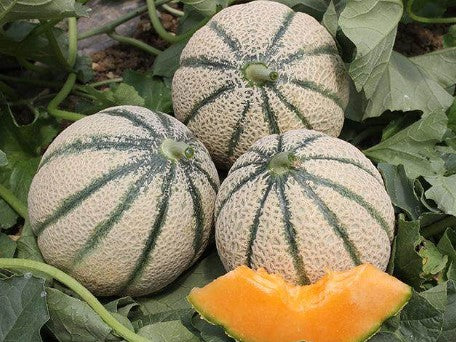Products
Categories
Best Sale
- Regular price
- Rs. 499.00
- Sale price
- Rs. 499.00
- Regular price
-
Rs. 609.00
Product sidebar
Product sidebar
Categories
Best Sale
- Regular price
- Rs. 499.00
- Sale price
- Rs. 499.00
- Regular price
-
Rs. 609.00

Muskmelon Seeds(2gm)
- Regular price
- Rs. 250.00
- Sale price
- Rs. 250.00
- Regular price
-
Couldn't load pickup availability
Share
🍈 Muskmelon Seeds (Cucumis melo)
Description:
Muskmelon, also known as cantaloupe, is a popular, sweet, and juicy fruit prized for its refreshing flavor and high nutritional value. This variety produces medium to large, round to oval fruits with smooth or netted skin and orange, aromatic flesh. Muskmelon thrives in warm climates and is cultivated for fresh consumption, fruit salads, juices, and desserts. Its rapid growth, high yield potential, and excellent market value make it a favorite among commercial growers and home gardeners alike.
Plant Characteristics:
-
Type: Annual trailing vine
-
Family: Cucurbitaceae
-
Vine Habit: Spreading with tendrils and large lobed leaves
-
Fruit Shape: Round to oval
-
Fruit Color: Light green to yellowish rind; orange sweet flesh inside
-
Flavor: Sweet, fragrant, and juicy
Growing Information:
-
Sowing Season: Late winter to early summer (depending on region)
-
Sowing Depth: 2–3 cm
-
Germination Time: 7–10 days
-
Spacing: 60–90 cm between plants and 120–150 cm between rows
-
Sunlight: Full sun (6–8 hours daily)
-
Soil: Well-drained sandy loam or loamy soil rich in organic matter (pH 6.0–7.5)
-
Watering: Regular and consistent; reduce water near harvest to improve sweetness
Cultivation Tips:
-
Provide trellis support for better fruit shape or allow vines to sprawl naturally.
-
Apply compost or organic fertilizers before planting for strong growth.
-
Mulching helps retain moisture, regulate soil temperature, and reduce weeds.
-
Regular monitoring for pests and diseases like powdery mildew, aphids, and fruit flies is essential.
Harvest:
Fruits are ready for harvest 80–100 days after sowing, depending on climate and variety. Harvest when the rind changes color slightly, develops a sweet aroma, and the stem near the fruit begins to crack slightly.
Uses:
-
Culinary: Fresh consumption, fruit salads, smoothies, juices, desserts, and garnishes.
-
Nutritional: High in vitamins A and C, potassium, fiber, and antioxidants.
-
Market Value: Highly demanded for its sweet taste, aroma, and refreshing qualities.
Nutritional Benefits:
Muskmelon is low in calories, rich in water content, and supports hydration. It boosts immunity, improves digestion, promotes skin health, and provides essential vitamins and minerals for overall wellness.
